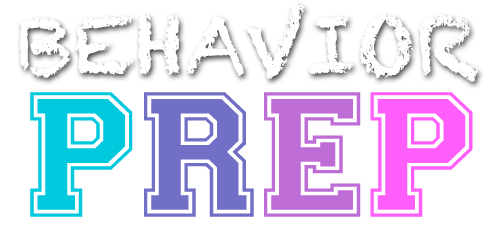F.1. Identify relevant sources of information in records (e.g., educational, medical, historical) at the outset of the case.
One of the responsibilities of a BCBA (Board Certified Behavior Analyst) is to review records and available data at the outset of a case. This step is important for gaining a comprehensive understanding of the client’s background, needs, and previous assessments or interventions. Here are some examples of the BCBA’s responsibilities in reviewing records and available data:
Comprehensive Assessment
The BCBA should review educational records, including Individualized Education Programs (IEPs), school reports, and progress notes. This information provides insight into the client’s educational history, previous interventions, and any specific areas of concern or strengths.
Example: A BCBA working with a child with autism spectrum disorder (ASD) would review the child’s IEP, including their current educational placement, goals, and progress reports, to understand the child’s academic abilities and challenges.
Medical and Health Records
The BCBA should review medical records and assessments to gain an understanding of any relevant medical conditions, medications, allergies, or other health-related factors that may impact the client’s behavior or intervention strategies.
Example: When working with a client who has a seizure disorder, the BCBA would review medical records, neurologist reports, and any seizure logs to understand the frequency and impact of seizures on the client’s behavior and overall functioning.
Behavior Assessments and Functional Analysis
The BCBA should review any previous behavior assessments or functional analysis reports to understand the client’s behavioral challenges, triggers, and maintaining factors. This information helps guide the development of effective behavior intervention plans.
Example: If a BCBA is working with a child with self-injurious behavior, they would review any previous functional analysis reports or assessments conducted by other professionals to identify potential environmental triggers or reinforcement contingencies.
Historical Data and Family Interviews
The BCBA may conduct interviews with family members or caregivers to gather historical information about the client’s developmental milestones, family dynamics, and previous interventions. This information can provide insights into the client’s social, emotional, and environmental context.
Example: In working with a child with selective mutism, the BCBA may interview parents and school personnel to gather information about the child’s communication patterns, anxiety triggers, and any previous strategies used to address the selective mutism.
By thoroughly reviewing records and available data, the BCBA can gather valuable information that helps inform their assessment, intervention planning, and decision-making processes. This comprehensive understanding of the client’s background and previous experiences is essential for developing effective and individualized behavior intervention plans.
Functional Behavior Assessment
BCBA (Board Certified Behavior Analyst) determines the need for behavior-analytic services by conducting a thorough assessment of the client’s behavior, skills, and environmental factors. This assessment process involves collecting information through various methods, such as direct observation, interviews, assessments, and record reviews. Based on the assessment results, the BCBA identifies areas of concern, determines the need for behavior-analytic services, and develops an appropriate intervention plan. Here are some examples of how a BCBA determines the need for behavior-analytic services:
Direct Observation
The BCBA may directly observe the client’s behavior in various settings, such as home, school, or community, to assess the frequency, intensity, and impact of problematic behaviors or skill deficits.
Example: A BCBA observes a child in a classroom setting and notices that the child engages in disruptive behaviors, such as yelling and throwing objects, which interfere with their learning and the learning of others.
Interviews and Functional Assessment
The BCBA conducts interviews with the client, family members, teachers, and other relevant individuals to gather information about the client’s behavior patterns, triggers, and maintaining factors. They may also use functional assessment tools to analyze the function or purpose of the client’s behaviors.
Example: A BCBA interviews parents and teachers of a child with autism who engages in self-injurious behavior. Through the interviews and functional assessment, the BCBA discovers that the behavior occurs primarily when the child is seeking sensory stimulation or avoiding demands.
Record Review
The BCBA reviews available records, such as medical reports, previous assessments, and behavior intervention plans, to gain a comprehensive understanding of the client’s history, previous interventions, and treatment outcomes.
Example: A BCBA reviews a child’s IEP, speech therapy reports, and previous behavior intervention plans to understand the child’s communication difficulties, progress, and any previous strategies used to address problem behaviors.
Skill Assessments
The BCBA may administer standardized assessments or conduct informal skill assessments to evaluate the client’s abilities and identify skill deficits in various areas, such as communication, social interaction, or daily living skills
Example: A BCBA uses a language assessment tool to assess a child’s expressive and receptive language skills and discovers significant delays in expressive language development..
Collaborative Consultation
The BCBA collaborates with other professionals, such as teachers, speech therapists, or occupational therapists, to gather information, share observations, and integrate different perspectives to inform the need for behavior-analytic services.
Example: A BCBA consults with a speech therapist who has been working with a child with language delays. They discuss the child’s progress, challenges, and consider the need for behavior-analytic interventions to address behavior problems that impede progress in speech therapy.
By utilizing various assessment methods and gathering information from multiple sources, the BCBA can determine the need for behavior-analytic services and develop an individualized intervention plan that targets the client’s specific needs and goals. The assessment process is crucial for understanding the client’s behavior patterns, identifying underlying factors, and establishing baseline data to guide effective intervention strategies.
